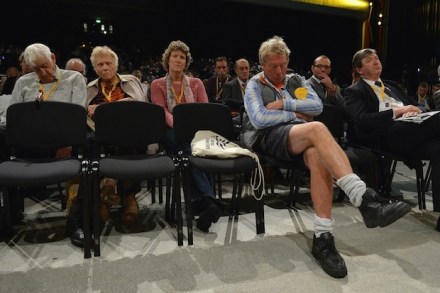Nick Clegg tells the Lib Dems, we’re the party of jobs
The Lib Dem conference rally was never going to be the same without Sarah Teather and her comedy routine. With Teather persona non grata following her decision to step down, it was duly a much tamer affair. The only risqué jokes were about Lembit Opik being bitten in the nether regions by a sausage dog. But seeing as Lembit has infuriated party loyalists by again calling for Clegg to go, they got a laugh from the leadership. The message of the conference rally was that the Liberal Democrats are the party of jobs. Nick Clegg claimed that the Tories weren’t the party of jobs, but the party of fire at



















